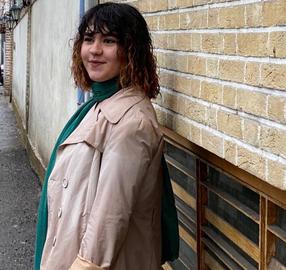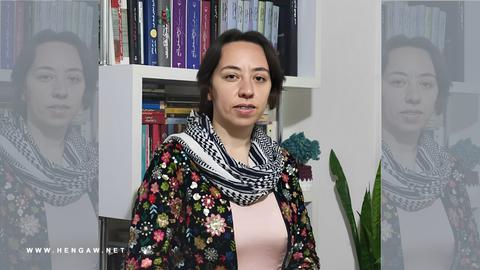“I have a tongue in my mouth, and I will not keep quiet until the day I die,” says Shirin Ebadi, the first Iranian woman to be awarded the Nobel Peace Prize. This lawyer has remained true to this claim until today, steadfastly advocating human rights despite her and her family facing harassment and repeated death threats.
Ebadi was also the first female judge in Iran, a title and position that was taken away from her after the Islamic Revolution of 1979. She has worked on many high profile cases until she was forced to leave Iran when the government forcibly shut down the Defenders of Human Rights Center, which she had founded, following the disputed 2009 presidential election. At the time, she had received numerous death threats.
Ebadi was born in Hamedan in 1947. Her father was the chief public attorney for the city and a professor of commercial law. He and his family moved to Tehran in 1948.
Ebadi was admitted to the University of Tehran’s Law School in 1965. In 1969, having received her bachelor’s degree, she passed her exams to join the Justice Ministry. She went on to attain a doctorate in law and, in 1975, she was appointed the presiding judge of Branch 24 of Tehran’s City Court.
Women Cannot Be Judges
However, after the Islamic Republic was established following the 1979 revolution, the new rulers of the country forbade women from being judges, so Shirin Ebadi and other female judges were dismissed from their posts. She was also demoted to the position of a secretary at the same court she had presided over. The situation became unbearable for her, “so I asked for an early retirement, which I was granted,” she says.
However, she reversed this decision when the government introduced the Islamic Penal Code bill to the parliament. “The first time I read it I couldn’t believe it,” she recalls. “I read it again and thought it was badly written. The third time it finally dawned on me that they really thought a woman was worth half a human being.”
Before being granted a license to practice law in 1991, Ebadi published a number of highly critical articles in magazines in protest against the violation of women’s rights.
“I would accept any legal case, but very quickly I discovered that a lawyer needed to pay bribes in court to make any headway,” she says. “So I put up a sign in my office that read, ‘Because of the special situation in the courts, I can’t accept cases. I can only consult [with clients].’ Then I was confronted with cases that no other lawyer would have accepted.”
The first high profile case that Ebadi accepted was that of Leila Fathi, an 11-year-old girl who had died after repeated sexual assaults. It was cases like this that led Ebadi to found the Society for Protecting the Rights of the Child in 1995. A year and a half later, she took up the case of Arian Golshani, and challenged the Islamic Republic’s custody laws in court.
Arian Golshani was a nine-year-old girl who was tortured and murdered by her father and stepbrother in a gruesome manner. After her parents separated, the law and the court handling the case had granted custody to the father, even though he was a known drug addict. The stepbrother was convicted of murder while the father evaded justice. The trial caused a public outcry and 10,000 people gathered at a memorial service for Golshani. In less than a month, parliament passed a law empowering the courts to remove a child from parental custody if they were proven to be unfit.
Ebadi represented many other people involved in high profile and contentious cases, including Zahra Kazemi, the Iranian-Canadian photojournalist who died in 2003 whilst at Tehran’s Evin prison. She also defended the children of Dariush and Parvaneh Forouhar, prominent dissident figures whose throats were cut by intelligence agents at their home in 1998 during a series of opposition killings that came to be known as the “Chain Murders.” Ebadi says she came across her own name while reviewing the Forouhars case.
Then, in 2000, Ebadi spent three weeks in detention for exposing the role of judiciary officials in the attack on student dormitories in Tehran. A year later, she founded the Defenders of Human Rights Center.
The Nobel Prize and Exile
In October 2003, Shirin Ebadi received the Nobel Peace Prize for her role in defending human rights, especially of women and children. The Islamic Republic authorities, including the reformist President Mohammad Khatami, reacted by calling the prize “political.”
“The people of Iran have been battling against consecutive conflicts between tradition and modernity for over 100 years,” Ebadi said in her acceptance speech in Oslo. “By resorting to ancient traditions, some have tried and are trying to see the world through the eyes of their predecessors and to deal with the problems and difficulties of the existing world by virtue of the values of the ancients. But many others, while respecting their historical and cultural past and their religion and faith, seek to go forth in step with world developments and not lag behind the caravan of civilization, development and progress. The people of Iran, particularly in recent years, have shown that they deem participation in public affairs to be their right, and that they want to be masters of their own destiny.”
Ebadi used the prize money to aid the families of prisoners and to create workshops aimed at raising awareness about civil rights. She is also active in representing the Baha’is, a religious minority that is not recognized by the Islamic Republic and whose rights are systematically violated.
Gradually, attacks against Ebadi intensified. In 2008, the official Islamic Republic News Agency accused her of seeking support from the West and, later the same year, the police shut down the Defenders of Human Rights Center. Ebadi and her family repeatedly received death threats.
While visiting England in June 2009, she decided to not go back to Iran. Since then, she has worked extensively, writing a bilingual monthly report on human rights violations in Iran, organizing seminars on human rights, and giving lectures in different universities, among other things.
Ebadi has received numerous honorary doctorates from universities across the world and other awards for defending human rights and democracy. In 2006, France’s government awarded her the Legion of Honor and, in 2011, the French city of Poitiers named a street after her.
“Naturally, the life that I’m living is not a very comfortable life,” Ebadi said in an interview. “But this is the price that we have to pay for freedom in Iran. I’m not the only one paying this price. My colleagues who are in prison are paying a higher price.”
During her years in exile, Ebadi tirelessly continued her efforts to expose the Islamic Republic’s complete disregard for the rights of women, children, as well as religious and ethnic minorities to the world.
The Islamic Republic, she said in an interview, is a “gender apartheid” regime.
“In the laws of the Islamic Republic, for example, it is written that the life of a woman is worth half of the life of a man or that the testimony of two women equals the testimony of one man. This means that they do not recognize women as complete human beings. Or, when laws take away rights from women, what they are doing is not recognizing the humanity and identity of a woman. Therefore, there are no differences between what I’m saying right now and the experiences of people of color in South Africa. I do not think there is a difference. If the expression of apartheid is used in racial issues, why should it not be used in gender issues?
“I hope that one day, when I look at the situation of women in the world, I see that gender apartheid has become a crime against humanity. In many countries, there are different campaigns. I hope that they get together and coordinate their efforts so that they can work better on gender apartheid.”
Since at least 2009, Iran has been rocked by a series of nationwide protests which has been brutally put down by the government. The latest and longest was the “Woman, Life, Freedom” movement that started in September 2022 following the death in police custody of Mahsa Amini.
Amid repeated crackdowns on protests, these questions have been raised by Iranians, both inside the country and in the diaspora: Is there a way forward toward freedom, justice and democracy?
What can people do in the face of a regime that stops at nothing to hold on to absolute power and to its misogynic and anti-democratic ideology? Ebadi answered this question in an interview in late 2023: “They have to continue. Whenever I talk to young people I tell them: imagine you are in a boat, and the sea gets rough, and the boat turns over. What are you going to do? You have to swim. If you think that you are too tired to swim, you are going to drown and die. You just need to keep swimming until you reach the land; there is no other way around it. In our country there is a religious dictatorship that interferes in all of the affairs of people’s lives. We can’t choose what to wear, we don’t have rights, and with all the wealth that exists in the country, one third of the population live under the poverty line.
“Over the past 40 years, the people of Iran have been trying to resist using different tactics and strategies. We were not looking for another revolution, but it seems like the only option we have. There is no other solution. We are exactly like that person who is drowning while their boat sank. We just have to keep swimming, there is no other way.”
visit the accountability section
In this section of Iran Wire, you can contact the officials and launch your campaign for various problems
































comments